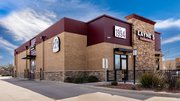Blog
An idea thats catching on
Until there is more education about food sensitivities, the onus remains on the consumer to make sure their meal is safe.
October 4, 2012 by Betsy Craig — pres, menutrinfo.com
I'm in the business of helping restaurants keeping their kitchens safe for all their patrons, especially those with food allergies and intolerances. I rarely write about food sensitivities from the consumer point of view, but this week I came across an excellent article in the East Bay Express in Oakland, Calif.
Writer Kathleen Richards, who has celiac disease, looks at the challenges of eating out, and finds some surprises behind the boom in "gluten-free" menu items:
"Luckily, awareness of food allergies among restaurateurs has grown significantly in recent years, especially for the gluten-intolerant (e.g., me). ... But, as with anything new, this increased awareness involves a certain learning curve. So while more and more restaurants are offering 'gluten-free' dishes, this doesn't always mean they're safe for those with celiac disease.
"Too many times I have ordered a 'gluten-free' dish that was served with a giant piece of bread on top, or ordered 'gluten-free' pasta only to discover it had been boiled in the same water as glutinous pasta. I don't want to sound ungrateful, because, even with these incidents, eating out these days is immeasurably better than it was even a few years ago, and awareness, although not universal, is miles ahead of where it used to be.
"But the rush to offer gluten-free food choices, while noble, may mislead sensitive diners. Because when a restaurant advertises 'gluten-free' dishes, many take that to mean the place has done its due diligence and knows how to prepare its food accordingly. And thus, we don't need to cross-examine our servers and chefs about ingredients and preparation. What we're coming to discover is that it's not necessarily a done deal."
Richards talks to several other celiac about how they protect themselves when ordering in restaurants. Careful interrogation of the staff seems to be the best defense, but one Oakland physician suggests a better way:
"(Melissa) Marshall, whose husband is a chef, hopes that, one day, food-preparers will be required to be educated about these issues, so she can avoid having to ask these types of questions — a process she said she finds 'embarrassing.'
"'People often get certification in food-handling safety in terms of hygiene and that sort of thing,' said Marshall. 'Granted, we live in a state with so many regulations, but it would nice if a part of that could be some education around food sensitivities. But until that's there, the onus is on me to make sure that I'm really okay.'"
I've trained literally thousands of people on exactly these issues, and couldn't agree more. Thanks, Kathleen.
About Betsy Craig
To date MenuTrinfo is responsible for menu nutritional information at over 100K US restaurants, food allergy and gluten free ANAB accredited training for hundreds of thousands of food service professionals. AllerTrain is the chosen food allergy training by NEHA providing continuing educational credit hours for those that take and pass its course. Finally, MenuTrinfo delivers food allergy confidence and allergen transparency to today’s food allergic consumer through its onsite division offerings, AllerCheck, Certified Free From allergens for spaces and food products which is an ISO 17065 certification and expert consultation and incident response support when needed.









